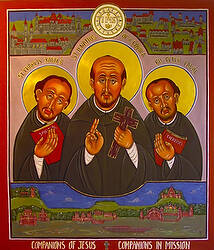This week, in light of a major event at my school in honor of Jesuit education, I have returned to a few resources on the early Society of Jesus to refreshen my understanding of both St. Ignatius of Loyola and his early companions. Like many in Jesuit educaiton, I've read hundreds of materials on the life of Ignatius, but it seems I can never get enough. His life, like that of all saints, is like a passage in scripture -- never exhaustible, always a fresh insight to be found.
In an essay titled "How the First Jesuits Became Involved in Education," by the well known historian Fr. John O'Malley, S.J. (published in The Jesuit Ratio Studiorum: 400th Anniversary Perspectives, 2000), Fr. O'Malley describes three aspects of St. Ignatius's spiritual development that I found to be very much relevant for the work of teachers and campus ministers today.
The first aspect is what Fr. O'Malley calls the "primacy of personal spiritual experience"; the second aspect refers to Ignatius's "personal evolution into spiritual maturity," or what Fr. O'Malley calls his "reconciliation with the world"; and the third aspect, according to Fr. O'Malley, was that Ignatius began "ever more explicitly and fully [to see] the Christian life as a call to be of help to others." To that end, no expression "appears more often in [Ignatius's] correspondence -- on practically every page -- than 'the help of souls.'"
As I reflected on this section of O'Malley's essay, I considered what it might mean for those of us in Jesuit education today, and I kept returning to the word and theme of "development." Ignatius's journey couldn't be rushed, and it could not be predicted. It took not months, but years, and it had to endure some brutal moments, chiefly his clash with the cannonball. Reflecting on this, it invites me to a new plane of patience both with my own life and those I teach. What room do I allow for development? Do I see spiritual growth as something I can orchestrate or manufacture, or is it something I approach with awe? What space do I give for students to work through the big questions? How do I allow my students to experience their own stages -- their own surrendering at Montserrat, their own introspection at Manresa?








